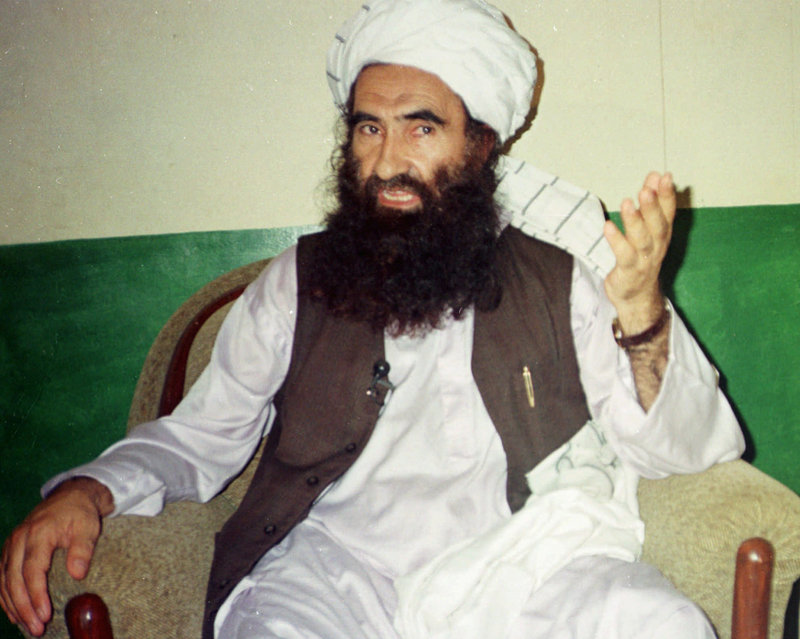VLADIVOSTOK, Russia – The Obama administration Friday declared the insurgent Haqqani network a terrorist body, a move that could undermine Afghan peace efforts and test fragile U.S.-Pakistani relations.
Secretary of State Hillary Rodham Clinton said she notified Congress of her decision, which bans Americans from doing any business with members of the Pakistan-based militant group and blocks any assets it holds in the United States.
“We also continue our robust campaign of diplomatic, military, and intelligence pressure on the network, demonstrating the United States’ resolve to degrade the organization’s ability to execute violent attacks,” she said in a statement.
Enraged by a string of high-profile attacks on U.S. and NATO troops, Congress gave Clinton a Sunday deadline to deliver a report on whether the Haqqanis should be designated and all of its members subjected to U.S. financial sanctions. Clinton’s decision comes amid numerous disagreements within the administration about the wisdom of the designation.
The United States already has placed sanctions on many Haqqani leaders and is targeting its members militarily. But it had held back from formally designating the al-Qaida-linked network a terrorist group over concerns it could jeopardize reconciliation efforts between the government and insurgents in Afghanistan, and ruffle feathers with Pakistan, the Haqqanis’ longtime benefactor.
Washington long has branded the group among the biggest threats to American and allied forces in Afghanistan, and to that country’s stability after American troops leave in 2014. A subsidiary of the Taliban, it is based in northern Pakistan but crosses the border to launch attacks, including a rocket-propelled grenade assault on the U.S. Embassy and NATO compound in Kabul in September.
The Obama administration has been trying to coax Afghanistan’s fighting groups into peace talks, offering the prospect of a Qatar-based political office for insurgents and even the transfer of several prisoners being held at the U.S. naval base at Guantanamo Bay, Cuba. Negotiations have been dormant for months, and the Haqqanis have been among the least interested in talking.
A senior Pakistani intelligence official said the administration’s decision could hurt U.S.-Pakistani relations and negatively impact the ongoing peace process with the Taliban. The official spoke on condition of anonymity because of the sensitivity of the issue.
The group also has enjoyed a close relationship with Pakistan. The United States and its often reluctant counterterrorism ally have been at loggerheads over the Haqqanis for years, with Washington accusing Islamabad of giving the network a free hand in the remote North Waziristan region and even providing it with some logistical support.
Pakistan says that its forces are stretched thin in fighting an insurgency that already has killed more than 30,000 people and that it cannot also take on the Haqqanis. Many analysts attribute the military’s reluctance to its historical ties to the Haqqani network’s founder, Jalaluddin Haqqani, and an assessment that the group can be an important ally in Afghanistan after U.S. forces withdraw in 2014.
Congress wanted action. In July, it set a deadline to prod the administration into imposing blanket sanctions on the group by designating it a foreign terrorist organization. Clinton’s decision will come into effect in seven to 10 days, U.S. officials said.
They cited disagreements about the designation. Some favored it, while others worried it could elevate the Haqqanis from their current status as an amorphous, tribal movement. That could end up hurting counterterrorism efforts by increasing their appeal among would-be jihadists.
Last month, the United States scored a major counterterror success when an unmanned drone strike in Pakistan near the Afghan border killed one of Jalaluddin Haqqani’s sons, Badruddin, who was considered a vital part of the Haqqani structure.
Copy the Story Link
Send questions/comments to the editors.



Success. Please wait for the page to reload. If the page does not reload within 5 seconds, please refresh the page.
Enter your email and password to access comments.
Hi, to comment on stories you must . This profile is in addition to your subscription and website login.
Already have a commenting profile? .
Invalid username/password.
Please check your email to confirm and complete your registration.
Only subscribers are eligible to post comments. Please subscribe or login first for digital access. Here’s why.
Use the form below to reset your password. When you've submitted your account email, we will send an email with a reset code.